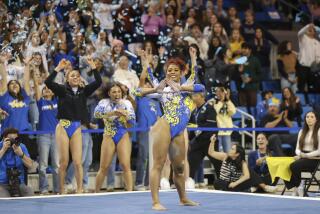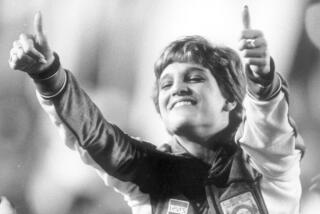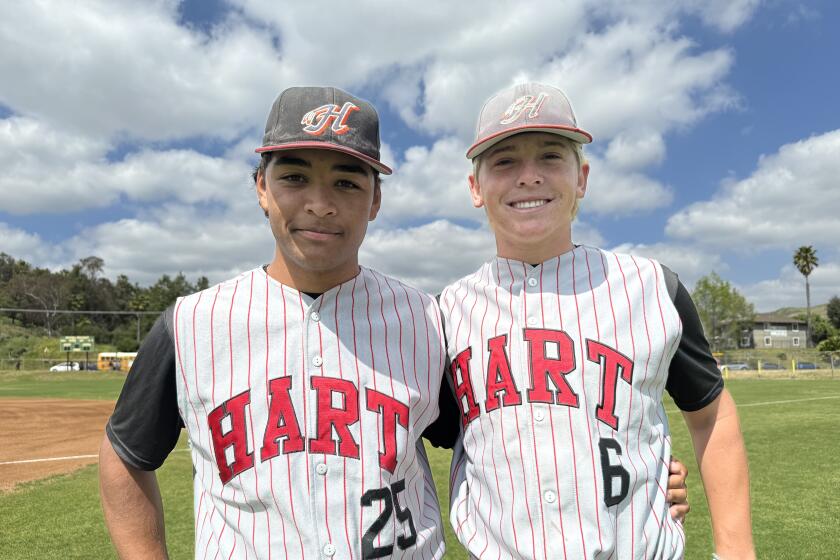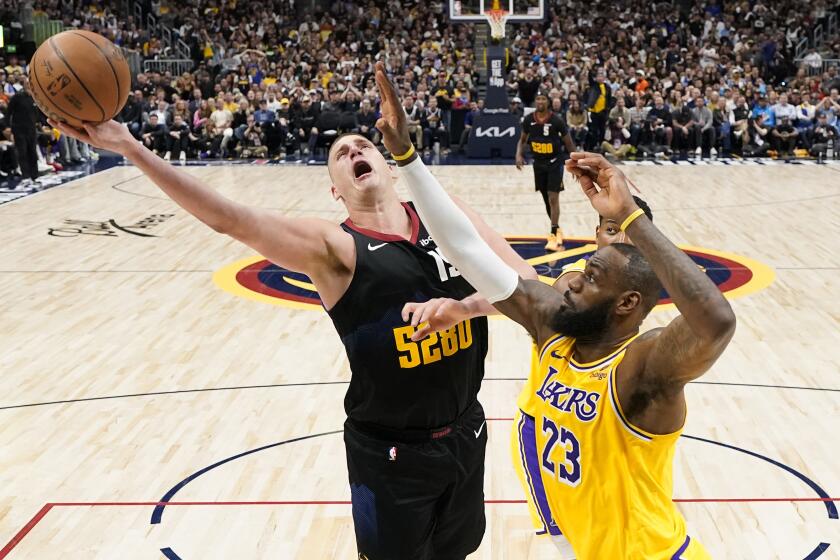Clark Goes Well Over the Wall
ASPEN, Colo. — Kelly Clark didn’t win the women’s superpipe finals Saturday night at the Winter X Games. But she pulled off a 900-degree revolution high above the pipe’s 17-foot wall, which is something very few women can do.
She didn’t finish second or even third, the 900 being not enough to make up for a fall earlier on her second and final run. But she ended each of her runs amid tremendous applause, which is a testament to her popularity.
Clark, it turned out, finished what others might consider a disappointing fifth, with a best-run score of 82.66, well behind local favorite Gretchen Bleiler, the Aspen resident who won with a first-run score of 89.00.
But Clark’s placing wasn’t what mattered most, as far as she was concerned. What mattered, she said afterward, was that she was feeling like her old self, full of desire, pushing herself to new heights and, more important, enjoying herself again.
“I’m just excited to be here and having fun,” she said.
It’s two nights before the superpipe finals and Clark is relaxing with teammates in a secluded cabin above nearby Snowmass Village. She can’t escape the media, even here, but she enjoys talking about a sport that has been such a large part of her life.
Clark, 21, a Vermont native who lives in Mammoth Lakes, has been riding for 18 years and has been a pro for five. Invariably, she is brought back to her most memorable night, when she was at the pinnacle of her career, standing atop the podium as the halfpipe gold medalist at the 2002 Winter Olympics in Salt Lake City.
That came shortly after an X Games gold in the superpipe.
The question invariably arises: How has winning an Olympic gold changed your life?
“I can’t even begin to describe it,” she responds.
But she remembers vividly the broken wrist she suffered in practice before the halfpipe final. And she recalls that the excruciating pain miraculously disappeared during and after her captivating run.
“I didn’t even feel the pain until the next day, so that’s a pretty good indication of what my feelings were like because it had been overwhelming,” she says. “It was worse than anything I had ever experienced.”
That is, until she began to succumb to burnout. People began to expect too much of her and competing was no longer fun.
Things came to a head at the 2003 Winter X Games, when she finished second in the superpipe final and was greeted by interviewers who asked what went wrong. “I’m like, well, I just got second — what more do you want from me?” she recalls.
Clark cut down on halfpipe events and performed poorly in most of those in which she did compete. She experimented with slopestyle events, which involves running a course lined with terrain-park features and jumps. She even tried back-country boarding and relished the solitude.
She might have stayed this course had she not injured her knee in the spring of 2004. She was off the snow for a dreadfully long eight months.
Meanwhile, young riders such as Hannah Teter, Elena Hight and Kjersti Oestgaard Buass had begun to elevate the sport, pulling off 900s like the men. This caused older riders to elevate their riding as well.
Clark was going stir crazy and hated being on the sidelines. She resolved to give the pipe another try when she recovered, and try she has. She returned to competition in the fall of 2004 and reeled off a string of firsts, seconds and thirds.
She finished the year ranked second in the Grand Prix overall standings and opened 2005 with a second in a Grand Prix race in Oregon and a triumph at the European Open.
“It’s really awesome to see what these young riders are doing and I know that I need that to push me,” she says. “I need them to make me progress my riding.”
Her progression came in the form of a graceful 2 1/2 twists, a move she had only recently begun to land consistently in practice, and one that will make her an even bigger threat in future events.
Perhaps even at Turin, Italy, in the 2006 Winter Olympics. “I can’t believe they’re already that close,” she says.
Shaun White won the men’s snowboarding slopestyle competition by scoring a 93 on the first of two runs — one that included two 900s. It was his third consecutive X Games gold in the event.
Janna Meyen of Bend, Ore., won the women’s slopestyle event.
Xavier de le Rue of France won a men’s Snowboarder X competition that featured several hard crashes and injuries.
Ben Jacobellis of Roxbury, Conn., had his board swept from beneath him and slammed the back of his head onto the ice. He was taken to Aspen Valley hospital and diagnosed with a moderate concussion.
His sister, Lindsey, won the women’s portion — for the third consecutive year — and afterward said of her brother, “I just hope he’s OK. He’s a strong guy and I love him very much.”
On Friday, Chris Klug suffered a broken collarbone in a fall while crossing the finish line. Klug, 32, will be sidelined at least six weeks. He won a bronze medal in the giant slalom at the Salt Lake City Olympics in 2002 and will try to qualify for the 2006 Games.
Brothers Reggie and Zach Crist of Sun Valley, Idaho, won the gold and silver in the Skier X competition. Enak Gavaggio of France won the bronze.
More to Read
Get our high school sports newsletter
Prep Rally is devoted to the SoCal high school sports experience, bringing you scores, stories and a behind-the-scenes look at what makes prep sports so popular.
You may occasionally receive promotional content from the Los Angeles Times.






